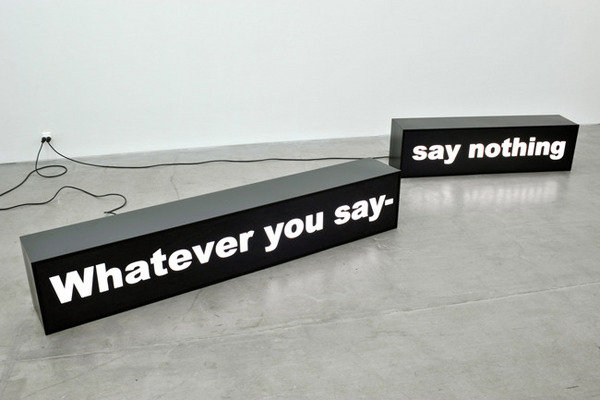New Ways of Doing Nothing
dal 26/6/2014 al 11/10/2014
Segnalato da
Robert Breer
Alejandro Cesarco
Etienne Chambaud
Natalie Czech
Oskar Dawicki
Edith Dekyndt
Mathias Delplanque
Heinrich Dunst
Gardar Eide Einarsson
Marina Faust
Claire Fontaine
Ryan Gander
Lasse Schmidt Hansen
Julia Hohenwarter
Karl Holmqvist
Sofia Hultén
Jiri Kovanda
Rivane Neuenschwander
George Perec/Bernard Queysanne
Superflex
Mario Garcia Torres a. o.
Vanessa Joan Müller
Cristina Ricupero
26/6/2014
New Ways of Doing Nothing
Kunsthalle Wien, Wien
The group exhibition devotes itself to a form of artistic production that opposes activity, doing and manufacturing and instead gives an affirmative slant to forms of doing nothing, of refraining or a tautology. Here, refraining from something not only leads to a critical moment but also a creative one. Works of Alejandro Cesarco, Natalie Czech, Claire Fontaine, George Perec/Bernard Queysanne, Superflex and many others.

Curated by Vanessa Joan Müller, Cristina Ricupero
Productivity and growth are the philosophical premises of the present day. Working
processes are being optimized to increase efficiency, working hours are being
deregulated until the distinction between work and leisure time disappears. Artistic
work seems to follow other criteria, but in this field too professionalization and self-
optimization are on the rise. But what would happen if ‘doing nothing’ or ‘inaction’
were to become a source of inspiration for a refusal to produce.
New Ways of Doing Nothing devotes itself to a form of artistic production that
opposes activity, doing and manufacturing and instead gives an affirmative slant to
forms of doing nothing, of refraining or asceticism. Here, refraining from something
not only leads to a critical moment but also a creative one. New Ways of Doing
Nothing – the title derives from Swedish artist Karl Holmqvist – focuses on positions
in contemporary art in which ‘doing nothing’ generates its own potential with respect
to the requirements (and impositions) of a society that concentrates on activity and
productivity: for example in Natalie Czech’s variation on a diary entry by the Russian
avant-garde poet Daniil Charms, who in 1937 noted: “Today I Wrote Nothing. Doesn’t
Matter.”
In his short story Bartleby, the Scrivener, published in 1853, Herman Melville
presents a prototype of refusal or noncompliance. Bartleby replies to all the tasks he
is given with a polite but decided “I would prefer not to.” In the course of the novella,
which runs to little more than eighty pages, he lapses into a state of total inaction
and becomes a figure, both stoic and passive, who represents existence outside
societal norms. Bartleby is a key figure of the modern, whose rhetoric of a passive
negativity is of essential significance for the self-image of our society, which is based
on work and progress.
The Danish artists’ group Superflex have created a video work entitled This Working
Life in which they asked a hypnotist to introduce members of the public to the world
of work. Something that might seem completely familiar – working with a clock in
the background – becomes a strange, almost traumatic activity that can only be
understood when the unconscious is activated. A further key work in the exhibition
is the film A Man Asleep (Un homme qui dort) by George Perec and Bernard
Queysanne. This film version of the story of the same name by Perec, written in 1972,
depicts the life of a student in Nouvelle Vague style: one day he decides not to attend
an exam and, moreover, not to do anything else from this moment on. Accompanied
by a suggestive voiceover, the nameless student wanders through an empty Paris
in search of a possibility of escaping all the demands of society. A Man Asleep was
written by Perec as a direct answer to Melville’s Bartleby and has lost nothing of its
relevance.
Other works in the exhibition take as their theme an artistic work that, even as it
reflects on the question of what it means to engage in artistic activities, is already
creating work. In Lasse Schmidt Hansen’s series of photos Making Things, for
instance, the artist constantly rearranges the furniture in his studio without directly
becoming productive. By way of contrast, Edith Dekyndt transposes the signal of a
“sleeping” computer in stand-by mode into a closed-circuit installation that creates
a suggestive aesthetic of inactivity, but also reminds us that a pure “off” no longer
exists.
New Ways of Doing Nothing devotes itself to a form of artistic production that opposes activity, doing and manufacturing and instead gives an affirmative slant to forms of doing nothing, of refraining or a tautology. Here, refraining from something not only leads to a critical moment but also a creative one.
Artists: Robert Breer, Alejandro Cesarco, Etienne Chambaud, Natalie Czech, Oskar Dawicki, Edith Dekyndt, Mathias Delplanque, Heinrich Dunst, Gardar Eide Einarsson, Marina Faust, Claire Fontaine, Ryan Gander, Lasse Schmidt Hansen, Julia Hohenwarter, Karl Holmqvist, Sofia Hultén, Jiri Kovanda, Rivane Neuenschwander, George Perec/Bernard Queysanne, Superflex, Mario Garcia Torres a. o.
Cristina Ricupero is a freelance curator and author and lives in Paris. She has
curated numerous exhibitions, for instance in Schirn Kunsthalle, Frankfurt am Main,
in Witte de With, Rotterdam, and in the Stedelijk Museum, Amsterdam.
Vanessa Joan Müller is Head of Dramaturgy at Kunsthalle Wien.
Image: Gardar Eide Einarsson, In Taxis, On the Phone, In Clubs and Bars, At Football Matches, At Home With Friends, 2013, © Gardar Eide Einarsson, Courtesy der Künstler/the artist und/and Yvon Lambert, Paris
Press
Katharina Murschetz
+43 (0) 1 5 21 89 - 1221
katharina.murschetz@kunsthallewien.at
Stefanie Obermeir
+43 (0) 1 5 21 89 - 1224
presse@kunsthallewien.at
Kunsthalle Wien GmbH
Museumsplatz 1 - 1070 Wien, Austria
Daily 10 am -7 pm Thurs 10 am -9 pm. Admission 8 euro.



